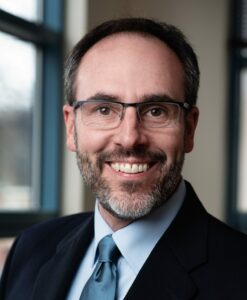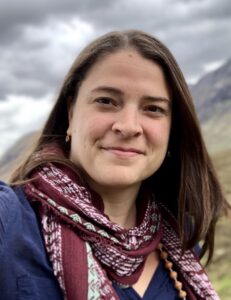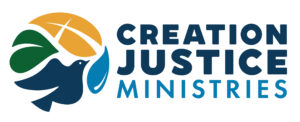
Weaving Threads in a Time of Unraveling
An Evening with Sherri Mitchell
Occurred on Tuesday, April 8, 2025
So much of what we are experiencing in our lives and in the world at this moment speaks of a great unraveling. The systems upon which our modern way of life is built — systems of extraction, of consumption, of colonization and violence — have brought destruction and death not only to so much of life on earth but also to our religious imaginations and our fundamental understanding of relationality. Centuries of domination and extraction have created the conditions which have brought us to this time of deep instability and suffering.
And yet, if we look more deeply, if we engage in the deep work of decolonization, we begin to see that the glimmers of another way of being are still present, still longing to emerge. We feel the embodied knowing of our place in the great web of interbeing and the possibilities of what right relationship with all creation could mean. In her book Sacred Instructions: Indigenous Wisdom for Living Spirit-Based Change, Sherri Mitchell writes:
“We are all tied to a lineage of love that has existed since time immemorial. Even if we haven’t had a direct experience of that love, we know that it exists and has made an indelible imprint on our souls. It’s remarkable to think that the entire span of human life exists within each one of us, going all the way back to the hands of the Creator. In our bodies we carry the blood of our ancestors and the seeds of the future generations. We are a living conduit to all life. When we contemplate the vastness of the interwoven network that we are tied to, our individual threads of life seem far less fragile. We are strengthened by who we come from and inspired by those who will follow.”
This spring, The BTS Center warmly invited you to join us for a conversation with Sherri Mitchell, Weh’na Ha’mu Kwasset, indigenous lawyer, author, and advocate, to explore what weaving together might mean in this time of great transition. The evening included reflections from our presenter and a panel of respondents, as well as music and space for engagement as we explored together the possibilities present in these times of turmoil and how we might, individually and collectively, rise to survive and to thrive as part of the great community of creation.
View the conversation below, recorded on April, 8, 2025:
Meet Our Presenter
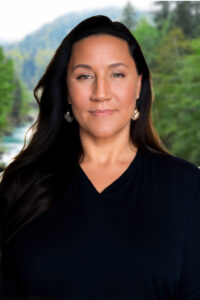 Sherri Mitchell — Weh’na Ha’mu Kwasset, is an Indigenous attorney, activist, and author from the Penobscot Nation. She received her Juris Doctorate from the University of Arizona’s Rogers College of Law, specializing in Indigenous Peoples Law and Policy. She is an alumna of the American Indian Ambassador Program, and the Udall Native American Congressional Internship Program.
Sherri Mitchell — Weh’na Ha’mu Kwasset, is an Indigenous attorney, activist, and author from the Penobscot Nation. She received her Juris Doctorate from the University of Arizona’s Rogers College of Law, specializing in Indigenous Peoples Law and Policy. She is an alumna of the American Indian Ambassador Program, and the Udall Native American Congressional Internship Program.
Sherri is the author of the award-winning book, Sacred Instructions: Indigenous Wisdom for Living Spirit-Based Change, which has been published in four languages. She is also a contributor to more than a dozen anthologies, including the best seller, All We Can Save: Truth, Courage, and Solutions for the Climate Crisis, along with Resetting Our Future: Empowering Climate Action in the United States, and My Life: Growing Up Native in America.
Sherri is the founding Director of the Land Peace Foundation, an Indigenous educational organization that focuses on Indigenous leadership, environmental justice, land rematriation, and kinship building. The Land Peace Foundation has provided training for some of the largest environmental NGOs on the planet, helping them develop better policies and procedures for engaging with Indigenous Peoples living on the front lines of climate change. They also curated an eight-part series with the Global Council on Science and the Environment that provided training for thousands of scientists and scientific scholars from more than 40 countries, highlighting Indigenous scholarship and traditional knowledge. Sherri was also a key member of the development team for the ACE Mandate of the U.N. Framework Convention on Climate Change (UNFCCC), under Article 6 of the UNFCCC and Article 12 of the Paris Agreement. This framework was adopted by the Biden Administration and is currently being used to provide education, engagement, training, and workforce development for climate action in the United States.
Sherri serves as a Trustee for the American Indian Institute, she sits on both the Global Indigenous Advisory Council and the North American Advisory Council for Nia Tero’s Indigenous Land Guardianship Program, and is a board member of the Post Carbon Institute.
Sherri is the recipient of several human rights awards, including the Mahoney Dunn International Human Rights and Humanitarian Award and the University of Maine Alumni International Human Rights Award, and her portrait is featured in the esteemed portrait series Americans Who Tell the Truth. She is the convener of the global healing ceremony, Healing the Wounds of Turtle Island, a gathering that has brought more than 50,000 people together from six continents, with elders from 40 Indigenous nations, to focus on healing our relationships with one another and with our relatives in the natural world.
Meet Our Respondents
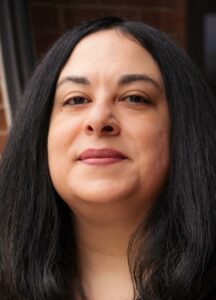 Kristina Lizardy-Hajbi, Ph.D., is Associate Professor of Leadership and Formation and Director of the Office of Professional Formation at Iliff School of Theology. In addition, she is coordinator of the Certificate in Latinx Studies for the Iliff/University of Denver Joint PhD in the Study of Religion. Kristina’s current research interests lie at the intersection of congregational leadership, community formation, and decolonial praxis, exploring questions about why and how liberative change unfolds. She is the author of Unraveling Religious Leadership: Power, Authority, and Decoloniality (Fortress, 2024) and co-editor of Explore: Vocational Discovery in Ministry (Rowman & Littlefield, 2022), as well as a regional advisor for the Exploring the Pandemic Impact on Congregations (EPIC) National Research Project. Kristina is an Ordained Minister in the United Church of Christ. Her most important work in the world, however, is being a tati (aunt) to two beautiful nephews and a partner to Ali. Kristina resides in Aurora, Colorado, on the unceded tribal lands of the Cheyenne and Ute peoples.
Kristina Lizardy-Hajbi, Ph.D., is Associate Professor of Leadership and Formation and Director of the Office of Professional Formation at Iliff School of Theology. In addition, she is coordinator of the Certificate in Latinx Studies for the Iliff/University of Denver Joint PhD in the Study of Religion. Kristina’s current research interests lie at the intersection of congregational leadership, community formation, and decolonial praxis, exploring questions about why and how liberative change unfolds. She is the author of Unraveling Religious Leadership: Power, Authority, and Decoloniality (Fortress, 2024) and co-editor of Explore: Vocational Discovery in Ministry (Rowman & Littlefield, 2022), as well as a regional advisor for the Exploring the Pandemic Impact on Congregations (EPIC) National Research Project. Kristina is an Ordained Minister in the United Church of Christ. Her most important work in the world, however, is being a tati (aunt) to two beautiful nephews and a partner to Ali. Kristina resides in Aurora, Colorado, on the unceded tribal lands of the Cheyenne and Ute peoples.
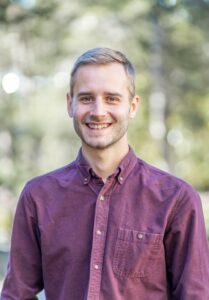 Avery Davis Lamb is Executive Director of Creation Justice Ministries. Creation Justice Ministries’ mission is to educate, equip and mobilize communions and denominations, congregations, and individuals to protect, restore, and rightly share God’s creation.
Avery Davis Lamb is Executive Director of Creation Justice Ministries. Creation Justice Ministries’ mission is to educate, equip and mobilize communions and denominations, congregations, and individuals to protect, restore, and rightly share God’s creation.
Avery has a background in both ecological research and faith-based environmental organizing, studying ecology in various ecosystems and organizing faith communities across the country in support of action on environmental justice. Previously he has worked for Sojourners and Interfaith Power & Light. He serves on the board for The Center for Spirituality in Nature and is a Fellow with the Re:Generate Program at Wake Forest Divinity School and the Foundations of Christian Leadership Program at Duke Divinity School.
Avery has a Bachelor of Arts in Biology and Sustainability from Pepperdine University. Currently, he is at Duke University pursuing a Master of Environmental Management in Ecosystem Science & Conservation and a Master of Theological Studies, with certificates in Faith, Food & Environmental Justice and Community-Based Environmental Management. His research focuses on the role of religious communities in building climate resilience and adaptation, with emphasis on the virtue of “climate hospitality.”
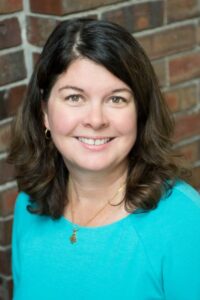 Rev. Stephanie Perdew, PhD is an ordained United Church of Christ minister who serves as director of the Damascus Project online theological education initiative of the Minnesota and Wisconsin Conferences, United Church of Christ and an affiliate faculty member at Garrett Seminary where she teaches Christian history. Formerly she spent two decades in parish ministry, served on the staff of the Illinois Conference UCC, and served as a Lilly Teaching Fellow at the University of Chicago Divinity School and as an adjunct faculty member at McCormick Theological Seminary. She is a graduate of St. Olaf College, Northfield, Minnesota and of Garrett Seminary in Evanston, Illinois.
Rev. Stephanie Perdew, PhD is an ordained United Church of Christ minister who serves as director of the Damascus Project online theological education initiative of the Minnesota and Wisconsin Conferences, United Church of Christ and an affiliate faculty member at Garrett Seminary where she teaches Christian history. Formerly she spent two decades in parish ministry, served on the staff of the Illinois Conference UCC, and served as a Lilly Teaching Fellow at the University of Chicago Divinity School and as an adjunct faculty member at McCormick Theological Seminary. She is a graduate of St. Olaf College, Northfield, Minnesota and of Garrett Seminary in Evanston, Illinois.
Stephanie is a tribal citizen of the Cherokee Nation and serves as the President of the Board of Directors for the Gichigamiin Indigenous Nations Museum. She lives in Grayslake, Illinois where her husband serves as a pastor. Their household includes two teenage boys and two cats. They are often at the boys' sporting events, hiking the trails of the Chain of Lakes region of Northern Illinois near their home, or paddling local lakes and rivers.
Meet Our Musician
 Pax Ressler (they/she) is a non-binary transfemme composer, organizer and cabaret theatre artist who uses music as a participatory tool to invigorate our collective imaginations towards social change. Their work harnesses the power of our shared values, cultivating collectivism, and dreaming abundant pathways for creativity amidst economic scarcity. Pax invites the performer-audience collective to rehearse their values and imagine a better world together through political cabaret (The Bearded Ladies’ “Contradict This!” & “American Girl Doll: The Musical” with Jackie Soro), communal singing with Rise Choir Collective (@risechoircollective), and trans and non-binary advocacy in the Philadelphia theatre sector with Genderfunk Philly (@genderfunkphilly). Pax’s compositions have been performed around the world, on the streets in parades and protests, and in elite cultural institutions like The Guggenheim Museum, Woolly Mammoth Theatre, and La Mama ETC (John Jarboe’s “Rose: You Are Who You Eat”). paxressler.com @paxressler
Pax Ressler (they/she) is a non-binary transfemme composer, organizer and cabaret theatre artist who uses music as a participatory tool to invigorate our collective imaginations towards social change. Their work harnesses the power of our shared values, cultivating collectivism, and dreaming abundant pathways for creativity amidst economic scarcity. Pax invites the performer-audience collective to rehearse their values and imagine a better world together through political cabaret (The Bearded Ladies’ “Contradict This!” & “American Girl Doll: The Musical” with Jackie Soro), communal singing with Rise Choir Collective (@risechoircollective), and trans and non-binary advocacy in the Philadelphia theatre sector with Genderfunk Philly (@genderfunkphilly). Pax’s compositions have been performed around the world, on the streets in parades and protests, and in elite cultural institutions like The Guggenheim Museum, Woolly Mammoth Theatre, and La Mama ETC (John Jarboe’s “Rose: You Are Who You Eat”). paxressler.com @paxressler

